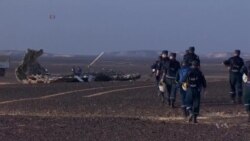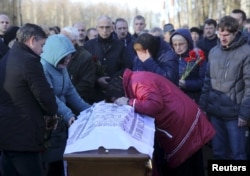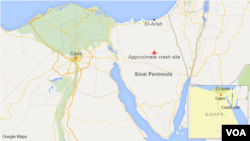British Prime Minister David Cameron says he believes it is "more likely than not" that a bomb brought down a Russian passenger jet over Egypt's Sinai Peninsula last week, killing all 224 people on board.
Speaking before talks with Egyptian President Abdel Fattah el-Sissi is in London Thursday, Cameron also noted that experts are not yet certain of the cause of the crash.
Also, British Foreign Secretary Philip Hammond said, "There is a significant possibility that the crash was caused by an explosive devise on board the aircraft."
But Russia's government has rejected that theory, saying it is too early to say what caused the plane to crash.
A Kremlin spokesman said Thursday any conclusions before an investigation is completed are "speculation."
An Egyptian presidential spokesman has also cautioned against drawing conclusions yet. However, at least one Egyptian official is reported to have gone so far as to say the crash was an accident – not an act of terror.
Forensic examinations
Experts are examining the wreckage for any signs of terrorism, while some reports say forensic examinations have revealed shrapnel in some of the victims. The experts also have retrieved both black box flight recorders.
The Islamic State group has claimed responsibility for the disaster, but has so far not presented any firm evidence to back it up.
Egyptian President Abdel Fattah el-Sissi has dismissed Islamic State's claim as "propaganda" and an effort to damage Egyptian security and stability. He is in London to meet Thursday with British Prime Minister David Cameron.
With Britain and Egypt offering vastly different opinions on the cause of the plane crash, the incident is sure to be high on the two leaders' agenda. The meeting at 10 Downing Street was scheduled before the crash took place.
Also Thursday, relatives of one of the plane crash victims held the first funeral associated with the crash. Friends and relatives of Nina Lushchenko gathered in the city of Veliky Novgorod, about 160 kilometers south of St. Petersburg, to bury her.
Abdel-Wahab Ali, the chief of the Sharm El-Sheikh airport, was promoted Wednesday to become assistant to the chairman of the state company that runs Egypt's civilian airports, according to The Associated Press.
It is not clear what effect this would have on his position at the airport.
IS allegation
David Schenker, a Middle East expert with the Washington Institute for Near East Policy, told VOA "it would not come as much of a surprise" if Islamic State was responsible for destroying the plane.
Schenker said the extremist group has an interest in attacking both Egypt and Russia, and that blowing up a soft target like a civilian airliner would send a powerful signal.
In Britain, Prime Minister Cameron's office issued a statement saying, "While the investigation is still ongoing we cannot say categorically why the Russian jet crashed. But as more information has come to light we have become concerned that the plane may well have been brought down by an explosive device."
The Metrojet Airbus took off from the Egyptian resort of Sharm El-Sheikh for St. Petersburg, Russia Saturday and shortly thereafter disappeared from radar.
A team of British aviation experts went to the Sharm-El-Sheikh airport to assess security there before any British flights will be allowed to leave the region.
White House spokesman Josh Earnest said Wednesday no U.S. air carriers regularly operate out of the Sinai Peninsula. But he noted that U.S. air safety experts warned commercial airlines several months ago that they were "at potential risk associated with extremist activity" if they flew over the Sinai.
Several airlines, including Air France, Lufthansa, Dubai-based Emirates and Qatar Airways have stopped flying over the Sinai Peninsula for safety reasons.
Fleet suspended
The Russian Federal Transport Agency said the airliner Metrojet has suspended all flights of Airbus A321 jets in its fleet since the crash.
Authorities said they have not found any evidence of a missile attack at the time the jetliner crashed Saturday. That leaves open the possibility of an explosion aboard the flight, either from a bomb or a mechanical failure.
A U.S. military satellite detected a heat flash at the time the jetliner crashed over the Sinai. But no missile launch or missile engine burn was detected.
Experts told U.S. media outlets the heat flash could point to a catastrophic event aboard the aircraft, such as an explosion, fire or even just the aircraft parts hitting the ground.









